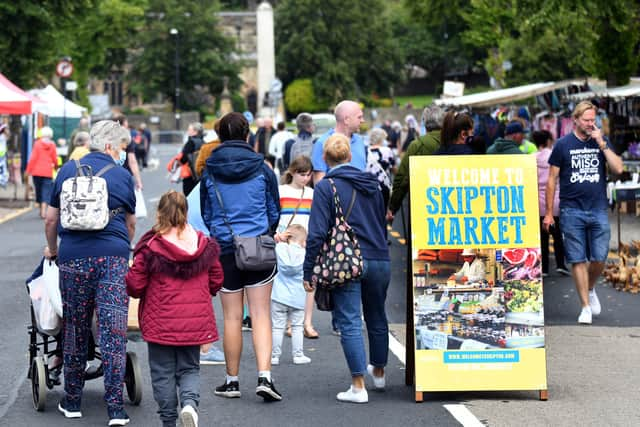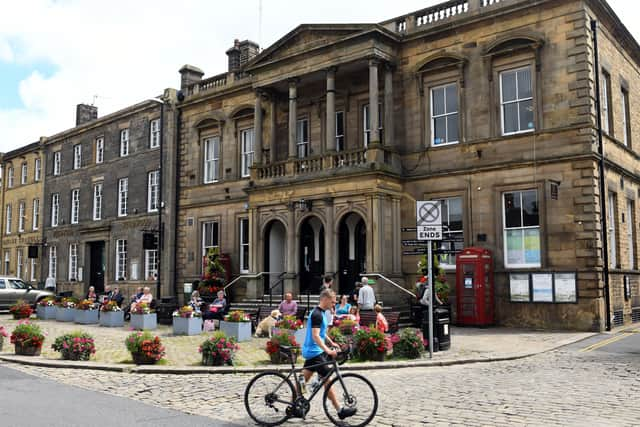Yorkshire’s market town gems – Bridging divide between old and new Skipton


It is three decades now since the market moved a mile up the Gargrave Road, but Skipton remains in every sense a market town, for both the agricultural and wider communities.
The hubbub at the new cattle mart has been subdued of late, as beasts are bought and sold in the presence of essential personnel only. Even so, the sheepdog sales that are also held there – the only such forum for them in Yorkshire – have managed to attract national attention for the technology they have pioneered. The buyers now are not huddled in a ring but scattered to the four winds.
Advertisement
Hide AdAdvertisement
Hide Ad“Someone in the Faroe Islands was watching one dog on YouTube and bought it over the phone,” says Jeremy Eaton, the mart’s general manager.


In February, a shepherdess from Northumberland sold her sheepdog for £18,900 to a cattle farmer in Oklahoma, and at the latest sale last month, buyers and sellers were able to talk to each other on Zoom before the bidding began.
Yet though animal sales are part of the fabric of Skipton they are also a world apart. Over the decades, the scale and size of the auctions have meant they have had to move progressively further from the town centre, where the market square is now filled three days a week by stalls of a more recognisable nature.
It was not always thus. The first cattle markets took place in the middle of the cobbled High Street, with animals spilling out on to the surrounding roads. Later they were moved to an open air market behind the Town Hall, before the old mart on Broughton Road gave them a permanent home conveniently close to the cattle wagons of the railway station. It stood for nearly a century.
Advertisement
Hide AdAdvertisement
Hide Ad“We have spent a lot of time trying to reconnect with the town itself since moving from there,” says Mr Eaton. “The mart is obviously important for the agricultural community – it’s a vital part of their business – but it’s also important for Skipton itself. It brings a lot of customers into the area who then stay in the town.”


When animals are absent, the mart is sometimes used for arts and craft exhibitions which attract a clientele that may never have witnessed a livestock auction.
“We see it as important because it connects people not only to us but also to the food chain,” Mr Eaton says.
The auction house moved to its present location in 1990 because expansion on the old site was deemed unfeasible and the transport of animals by train no longer necessary. But its relocation to the fringe of the town centre was symbolic of the economic shift Skipton itself was seeing. Its prosperity today is underpinned by tourism as much as by agriculture, and it has adopted a forensic approach to marketing itself.
Advertisement
Hide AdAdvertisement
Hide AdAndrew Mear, a property owner who chairs the town’s Business Improvement District, talks of modernising what he calls “the new Skipton” whilst retaining the traditional feel of the self-proclaimed Gateway to the Dales.
“It’s like an England of old in some ways,” he says. “Life might be a bit slower but people are nicer.”
Yet it is often younger consumers who are the biggest spenders, he points out. “So we have free wi-fi across the town for young people to access the same services they would in a big city.”
Some of the other innovations are designed to be less visible.
Advertisement
Hide AdAdvertisement
Hide Ad“It’s amazing what technology can do nowadays. We’re investing in a new CCTV system which collects data on what people are doing and where the footfall is,” Mr Mear says.
It’s not a question of spying but of intelligently gathering marketing information that local traders can make use of, he argues.
“Town centres have to adapt to stay relevant. We need all the data we can get.”
The latest development, however, has seen Skipton re-embrace its roots by closing the high street to traffic on market days to give shoppers free rein.
Advertisement
Hide AdAdvertisement
Hide AdMr Mear says he had long argued for such an arrangement, sometimes against strong opposition.
“I’d always been told it would be too difficult to implement – but suddenly Covid made things possible. We had to get the market back on its feet and so ways were found to close the street to traffic between 10 and four on Wednesdays, Fridays and Saturdays. The pandemic has made people wake up.”
The arrangement has not been universally popular with stallholders but Mr Mear would like to see it made permanent.
“The other Friday the sun was shining and people were sitting out with no worry about traffic, and there was a completely different feel to the town. It was much more European.”
Advertisement
Hide AdAdvertisement
Hide AdAmbience counts for a lot, he says. “It’s the leisure industry that will save the high streets. People will be drawn to Skipton because it’s a nice place to be, and they will do some shopping while they’re here.
“For retail to survive, it has to have that leisure element, and while Skipton has a lot, it could do with more.”
In particular, he says, it needs a hotel in the town centre, and he would have dearly liked to apply his property development skills to turning the old Rackhams department store into one after it closed its doors last year. As it is, it has been taken by another retailer.
He is happy enough to harness the town’s agricultural heritage to promote its present-day offering, though. “We had a campaign a few years ago called Flock to Skipton,” he says. “When the present problems are behind us I’d like to relaunch it to persuade people to flock back here.”
Advertisement
Hide AdAdvertisement
Hide AdEditor’s note: first and foremost - and rarely have I written down these words with more sincerity - I hope this finds you well.
Almost certainly you are here because you value the quality and the integrity of the journalism produced by The Yorkshire Post’s journalists - almost all of which live alongside you in Yorkshire, spending the wages they earn with Yorkshire businesses - who last year took this title to the industry watchdog’s Most Trusted Newspaper in Britain accolade.
And that is why I must make an urgent request of you: as advertising revenue declines, your support becomes evermore crucial to the maintenance of the journalistic standards expected of The Yorkshire Post. If you can, safely, please buy a paper or take up a subscription. We want to continue to make you proud of Yorkshire’s National Newspaper but we are going to need your help.
Postal subscription copies can be ordered by calling 0330 4030066 or by emailing [email protected]. Vouchers, to be exchanged at retail sales outlets - our newsagents need you, too - can be subscribed to by contacting subscriptions on 0330 1235950 or by visiting www.localsubsplus.co.uk where you should select The Yorkshire Post from the list of titles available.
Advertisement
Hide AdAdvertisement
Hide AdIf you want to help right now, download our tablet app from the App / Play Stores. Every contribution you make helps to provide this county with the best regional journalism in the country.
Sincerely. Thank you.
James Mitchinson, Editor
Comment Guidelines
National World encourages reader discussion on our stories. User feedback, insights and back-and-forth exchanges add a rich layer of context to reporting. Please review our Community Guidelines before commenting.